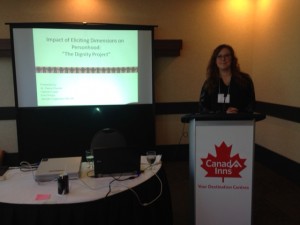In June of 2015, Klinic and the WRHA integrated Tuberculosis (TB) services received a one year grant from the Manitoba Patient Access Network steering committee to implement the Dignity Project. Based on the previous work of, and in collaboration with, Dr. Harvey Chochinov (Cancer Care), Chochinov et al. concluded that asking a relatively simple question can provide a better understanding into a person’s life, for whom we are providing care, that can help us provide more personalized care. (Chochinov et al. J Pain Symptom Mgmt 2015;49(6):974-980)
I was able to sit in on a presentation that several of the dignity partners collaborated on, at this year’s Health Ethics Forum through the Manitoba Provincial Health Ethics Network. The presenters included Erin Phillips of Klinic, Dr. Pierre Plourde and Jennifer Eaglesham from the WRHA. The goal of this presentation was to demonstrate how work, like that done in the Dignity Project, fits with providing ethical services.
Tuberculosis and Latent Tuberculosis
At Klinic we provide care to persons not actively sick with Tuberculosis, but who have had a skin test indicting they carry the disease: this is often called Latent TB (LTB). If the patient wants to be preventatively treated, they work with us over approximately 9 months following a best practice medication regime. We offer education for LTB as well as follow-up for the entire time clients are taking the treatment. Most of the LTB clients we see are newcomers and come from countries where TB is still quite prevalent, so we are careful to consider and be sensitive to their experiences and attitudes with and about TB, as there can be stigma.
Clients are expected to attend monthly appointments with nurses as well as the lab, which can be difficult for folks to commit to. The majority of LTB clients choose to not start treatment for a variety of reasons. Klinic is currently treating 104 clients and as of January 2014-2015 saw 474 clients in the clinic.
The Dignity Project at Klinic
Is there anything more that you think we should know about you as person that might help us to provide the best possible care for you? Though a seemingly simple question the reality is that in busy healthcare systems there is often little room for this type of open ended connection. However, previous research demonstrated that by engaging clients in this way there would be greater satisfaction, and engagement in care plans.
Throughout the course of the project, both sites used a Plan Do Study Act (PDSA) approach, which is a systemic series of steps to learn and gain knowledge for the continual improvement of a process.
Plan- involves identifying a goal or purpose, formulating a theory, defining success metrics and putting a plan into action.
Do- the components of the plan are implemented
Study- outcomes are monitored to test the validity of the plan for signs of progress and success, or problems and areas for improvement.
Act – this step closes the cycle, integrating the learning generated by the entire process, which can be used to adjust the goal, change methods or even reformulate a theory altogether.
These four steps are repeated over and over as part of a never-ending cycle of continual improvement.
The Results
Klinic staff were asked about their experience at several points in the project. When the project was presented, staff members were excited and interested in the previous dignity research done, and open to implementing the question into their own work. In the end the attitudes of the nurses and practitioners involved remained positive and engaged throughout the study.
Feedback so far shows that asking this question has made clients feel cared for, connected to their nurse and gave them a chance to share something they might not otherwise. This study was inspiring and important to our clients, and a positive learning experience for the staff involved. We expected some of the outcomes we have seen, but were also pleasantly surprised in some of the answers given. The nurses who asked this question have said it helped them be intentional with getting to know their clients.
When I sat down with Erin to talk about her role in the project, I asked her what she thought the most vital learnings were for her as a service provider. Erin said that a key learning was the importance of the human connection, for the whole team, that it supported inter-professional work, with the client always at the centre. Erin also shared, “Anyone can do it, in any way they want. Doing it with intention- real intention- is evident to the client.”
Finally, Erin felt it was great that this kind of thing happens at Klinic, where there is a culture of respect and partnership, and a belief that this kind of work is important.
In addition to presenting at this conference, the team will be publishing the final paper within the next few months; it will be presented at the TB Management meeting and for a few other groups still to be determined when complete. I look forward to seeing the result of this exciting work.


